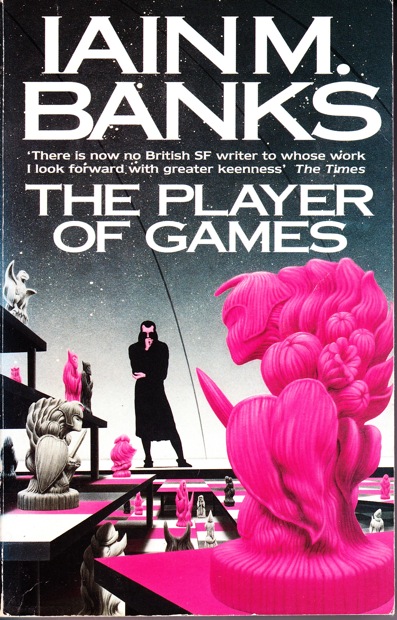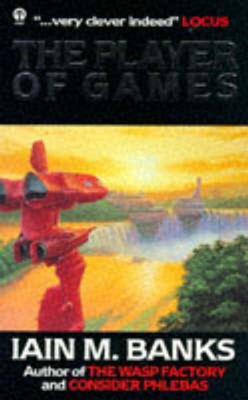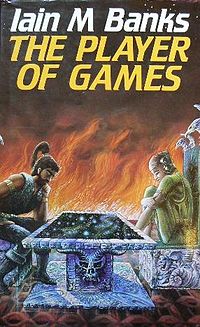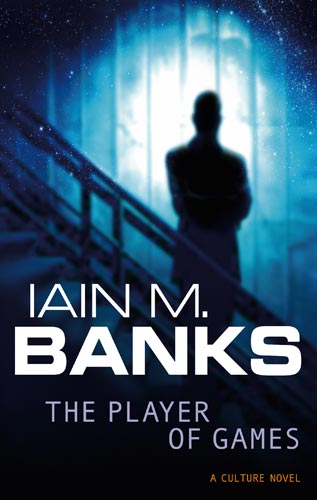One of my favorite books by one of my favorite authors is The Player of Games by Iain M Banks. It is a Culture book, the vast anarcho-communist utopian space opera setting that Banks has designed from the ground up to be both self-consciously rational and pure wish-fulfillment for those of us who like their escapism with a hefty dollop of moral superiority. The Culture has no money and is made up of an aggregate of alien races and artificial intelligences, include self-aware spaceships with jokey names.
The Player of Games is about a man whose job is to play games (I told you the Culture was a utopia), who is recruited by the Culture’s dirty tricks espionage group Special Circumstances to help them engage with something they’ve never run into before: an empire that is built around a very large, very complex game. The victor of a population-wide tournament becomes the new emperor.
I do not mention this book to praise it, but rather to use it as an example as I discuss the complexity of the abstract concept that we call genre. If genre was a coworker, he’d be that guy at the end of the hall that is absolutely essential to ongoing operations but is also annoyingly pedantic about minor, almost trivial items.
Genre is used in a variety of different ways: as a marketing tool, as a critical tool, as a tool for readers to identify what they want to read next and as a stick that some people use to beat up on other people for their reading tastes. Genre also provides a veritable catalog of generic elements that creators can use when constructing their works.
The Player of Games is a science fiction novel. (If you want to get pedantic and insist that SF stands for speculative fiction, it fits under that rubric as well.) There are genre elements galore: spaceships, aliens, worldbuilding – the author even admits that he stole the primary setting for the first half of the novel from Larry Niven’s Ringworld. On paper, this has all the trappings of a generic novel; after all, the more genre elements that a work contains, the more generic a work becomes.
And if you were marketing The Player of Games, the smart money would be to lean very heavily on the “spaceships and aliens” angle. It’s a book that rewards an educated and opinionated reader, though, so perhaps the marketing could even be tweaked by indicating that it contains “spaceships and aliens, but smarter.” This reveals one of the main weaknessness of the genre concept – it reduces complexity to its lowest common denominator in an effort to attract as many readers as possible. In theory, every iterative step away from the core generic descriptors risks the alienation of readers who are only (dis)interested in the generic elements.
As a consumer, I rely very heavily on genre to help me make intelligent choices. For example: I do not enjoy the adrenal rush that comes from people jumping out from behind things, which happens to be a core element of the horror genre. As a result, I tend to steer away from the horror genre as a general rule, which has probably resulted in me missing out on work that is probably pretty good, despite the inclusion of jumpy-outy bits. And yes, there are plenty of other, non-horror movies that contain jumpy-outy bits – is Alien a horror film or a science fiction film? Why can’t it be both? Oh yeah, because marketing demands that it be given a straightforward handle that can be given to potential consumers.
I also happen to enjoy spaceships and aliens and I recognize that there is a vast gulf of difference between The Player of Games and Star Wars, despite the fact that both can technically be shelved under that particular heading. Because my tastes are broad, a listing of genre elements offers a good starting point. But when tastes are prescriptive (as in my blanket disregard of the horror genre, above), there is a very good chance that marketing by genre is not actually helping bring in customers.
Genre can also be challenging in a critical context. When I read a review that includes some variation of “this novel transcends genre conventions” I immediately read that as “the novel contains generic elements but doesn’t use them generically.” For example: The Player of Games contains spaceships, but those spaceships are self-aware and have names like GCU Of Course I Still Love You, Superlifter Kiss My Ass, GSV Unfortunate Conflict of Evidence and so forth. This is an obvious stab at the inherent conceit in most space operas that ships must have big, imperious names.
Banks also points out [1] that having names that are self-consciously jovial tends to disarm potential opponents because they are less likely to take the ships seriously. The worldbuilding that comes from such a simple inversion of the genre convention really adds to the glamor constructed by the novel, but it may or may not be what the standard genre fan was looking for when he picked up a book about spaceships (and aliens). But it is absolutely the kind of thing that a critic would hold aloft when praising a book for moving past the generic elements that it’s built on.
On the flip side, some critics are known for using genre as a kind of yardstick – separating genres into categories, most often of the “good vs bad” variety. Just as there are any number of essays written by any number of good critics imploring readers to look beyond genre conventions and try something new, there are any number of critics who look down their nose at genres they consider to be somehow less important. This critical shaming doesn’t just stop with critics, though. Margaret Atwood is well known for claiming that she doesn’t write science fiction, even though she clearly does.
Some people revel in this, repurposing labels for their own use: Nobrow and Lowbrow are the two most obvious examples. But for most, genre is a ghetto – a well-populated ghetto, to be sure, but still a ghetto. Part of that has to do with the mainstream culture’s attitude towards genre works and part of that has to do with the consumers of the genre, which is another topic entirely.
Banks, on the other hand, doesn’t shirk from claiming that he writes science fiction. In fact, it’s very obvious that he enjoys spaceships and aliens and is quite happy to continue to be paid to write them, thank you very much. And I’m happy to enjoy what he does with them because the results are interesting and original and not at all what is expected.
Unfortunately, most authors do not have the sheer creative energy that Banks brings to the table. Most use generic elements as a sort of construction set, building weird stories that tend to violate the “could this story be told in an ordinary setting?” rule as a matter of course. And that’s one of those places that genre falls down, in my opinion. Someone writes a good story that introduces a nifty concept and someone else comes along and uses that same concept without doing anything original or interesting with it. The result comes across as, well, generic.
I fully expect an entire cottage industry of Harry Potter and Scott Pilgrim clones to come along in the next generation of creators, the same way that the mid-70s were dominated by Tolkien clones and Black Sabbath knock-offs. In this way, successful creators could be said to become a genre unto themselves, regardless of what parent genre they were marketed under[2].
Given my druthers, I’d prefer that we did away with genre altogether. It’s a useful tool, to be sure, but it’s also a tool that is leaned on far too much, far too often. Unfortunately, it’s not a very versatile tool and, when all you have is a hammer, everything tends to look like a nail. I get that without genre, all of the books would just be in one big section marked “fiction” and that some kind of sorting mechanism is necessary to find what you really want to read (or really don’t want to read, as the case may be).
However, genre doesn’t really do a good job when it is applied to marketing. By virtue of how the two are used in conjunction, the most generic books tend to float to the top. The truly interesting books take a little time to find their niche and fall out of the marketing by genre idea because they don’t exactly fit into the standard genre boxes. Ironically, looking for exceptions to the rules of genre tends to lead to exceptional works.
In the end, genre is a tricky thing that works perfectly at separating works by element, except when it doesn’t. The Player of Games is a great example of this. It contains spaceships and aliens but is in no way the poster child for either generic element and searching for it under those terms would be a fool’s errand. Critics might look down upon it because it is absolutely science fiction (and happy to be so) and they would prove themselves foolish if they did because it is the kind of book that critics hold up to indicate that science fiction and literature are not mutually exclusive. Which is as it should be.




